The Challenge of Imagining Thrutopias with Jennifer Browdy, Pt. 2 of 2
The Challenge of Imagining Thrutopias with Jennifer Browdy, Pt. 2 of 2 – How To Write the Future podcast, episode 111
“I think maintaining our own individual health is a really important part of being able to contribute to broader social health.”
— Jennifer Browdy
In this latest How To Write the Future podcast episode, host Beth Barany continues her conversation with Jennifer Browdy, PhD Professor of Comparative Literature & Media Arts, publisher of Green Fire Press, and award-winning author. Together they discuss Jennifer’s “Women Write the World” class where she shares why it’s important to maintain a positive outlook for the future and how seeing what we write could be beneficial to others.
Platforms The podcast is available on Apple Podcasts | Buzzsprout | Spotify | Podcast Addict | Amazon Music | Youtube
RESOURCES
Free World Building Workbook for Fiction Writers: https://writersfunzone.com/blog/world-building-resources/
Sign up for the 30-minute Story Success Clinic with Beth Barany: https://writersfunzone.com/blog/story-success-clinic/
Get support for your fiction writing by a novelist and writing teacher and coach. Schedule an exploratory call here and see if Beth can support you today: https://writersfunzone.com/blog/discovery-call/
About the How To Write the Future podcast
The *How To Write The Future* podcast is for science fiction and fantasy writers who want to write positive futures and successfully bring those stories out into the marketplace. Hosted by Beth Barany, science fiction novelist and creativity coach for writers. We cover tips for fiction writers. This podcast is for readers too if you’re at all curious about the future of humanity.
This podcast is for you if you have questions like:
– How do I create a believable world for my science fiction story?
– How do I figure out what’s not working if my story feels flat?
– How do I make my story more interesting and alive?
This podcast is for readers too if you’re at all curious about the future of humanity.
About Jennifer Browdy
Jennifer Browdy PhD is a Professor of Comparative Literature & Media Arts at Bard College at Simon’s Rock and the Open Society University Network. She is the publisher of Green Fire Press, specializing in “books that make the world better,” and the author of several award-winning books, including Purposeful Memoir as a Quest for a Thriving Future (Nautilus Gold Award winner, 2022); The Elemental Journey of Purposeful Memoir (Nautilus Silver Award, 2017), and the memoir, What I Forgot …And Why I Remembered (International Books Awards finalist). Her current work-in-progress focuses on necessary transformations for education in the 21st century, ideas she is sharing on her Substack blog, the Spirit of Education. She co-hosts a vibrant online community for writers, Birth Your Truest Story, where she also offers live and on-demand courses in “writing to right the world” and purposeful memoir. For information on memoir writing workshops, author coaching and manuscript review visit: Jenniferbrowdy.com.
Facebook: https://www.facebook.com/jenniferbrowdy / https://www.facebook.com/jbrowdy/
Subscribe to my Substack newsletter, Writing to Right the World. https://jenniferbrowdy.substack.com
Transcript for The Challenge of Imagining Thrutopias with Jennifer Browdy, Pt. 2 of 2
[00:00:00] BETH BARANY: Hey, everyone. Welcome back or welcome to How to Write the Future podcast.
[00:00:04] I am your host, Beth Barany. I am an award-winning science fiction and fantasy writer, also creativity coach and writing teacher for science fiction and fantasy authors.
[00:00:15] I have this podcast because I care very much about creating positive, optimistic futures through our stories.
[00:00:22] So I host other writers and thinkers and futurists and also share my thoughts on how to do that from the practical to the theoretical and everything in between.
[00:00:32] So thank you very much for being here with us today.
Part 2 with Jennifer Browdy: Suggestions and Tips to work on your positive, optimistic future
[00:00:36] BETH BARANY: Enjoy part two of my conversation with my guest, Jennifer Browdy.
[00:00:41] Are there any other suggestions that you have for young people or anybody who wants to work on their positive, optimistic visions for the future? What are some resources or tips that you have for them? For us?
[00:00:54] JENNIFER BROWDY: I think that many of us tend to be in our heads way too much, and we just spend a lot of time on screens and in our own heads and I think getting away from the screens, getting away from the desk, getting out into the world, getting out in nature, doing things in our bodies, moving our bodies.
[00:01:14] I think that’s really important. I mentioned my Substack blog, The Spirit of Education. One thing that I think I’ve written about already, but if not, I will be.
[00:01:22] I’m really not a big fan of the only embodied education being competitive sports at the K to 12 age.
[00:01:31] So that seems to be the outlet is, when kids are encouraged to move, it’s in this competitive way.
[00:01:38] Yeah.
[00:01:39] JENNIFER BROWDY: So, I, I really think that is not healthy.
[00:01:42] And, there’s your kitty.
[00:01:44] And Yeah. Animals. We need to spend more time with animals.
[00:01:48] The other thing in my, hidden in my bio is that I have been doing a lot of riding, horseback riding and writing. I lead these tours of writing and horseback riding has really been a huge, transformative thing for me to get back to that as a, as an older adult.
[00:02:06] And, so I would encourage people to do that too. It’s, it’s really healthy.
[00:02:11] So the thing about maintaining a positive outlook is you have to have, you have to be in good spirits yourself.
[00:02:17] If you’re feeling down and paralyzed and overwhelmed and anxious, it’s really easy to get into that state.
[00:02:25] How can you possibly write a positive future without feeling like you’re just pie in the sky and rose-colored glasses?
[00:02:32] I think maintaining our own individual health is a really important part of being able to contribute to broader social health.
[00:02:39] BETH BARANY: Yeah. Yeah. I love that. I’m a big proponent for walking.
[00:02:43] I often walk and then write, and I do a lot of thinking and processing while walking and. I’m really glad that, that you brought that up.
[00:02:51] And, I see that you offer courses and support for people who want to write about their lives in a way that’s impactful.
[00:02:59] And I really love your phrase.
[00:03:01] I read, your piece on– The world writes. So, world and then Wright — W-R-I-G-H-T.
[00:03:09] You coined it from a playwright.
[00:03:12] And I love your phrase, “writing to right the world.”
[00:03:15] Do you wanna say a little bit more about that and what you offer and how you support writers there?
[00:03:20] JENNIFER BROWDY: Yeah. So, in my, Purposeful Memoir Is a Quest For a Thriving Future book is where I’ve started to talk about world wrights, which is a term that just came to me on the beach as many good ideas do. And so playwrights write plays and world wrights write to make the world better, which is also the motto of my publishing company, Green Fire Press is dedicated to books that make the world better.
[00:03:43] And the idea of seeing what we write, whether it’s fiction or memoir or whatever it is, in terms of how it could be beneficial to others. So, to have that kind of explicit mission in mind.
[00:03:56] I got this idea in connection with memoir because memoir is often seen as a kind of self-indulgent, navel gazing form, and, it can be, and there are a lot of memoirs out there that are just laments.
[00:04:09] There’s a lot of trauma literature out there that really doesn’t go beyond recounting the trauma, which has therapeutic value for the person who’s recounting it, but not necessarily for the readers.
[00:04:20] In the course of teaching a lot of courses on memoir, I just began to think that we need to get beyond all those challenges that inevitably come into every life story and think about what are the life lessons learned?
[00:04:34] What do I have to share from my life experience that can be a benefit to others who may be experiencing something similar or, may know people who are experiencing something similar?
[00:04:44] So when I do author coaching, I try to get people to think about this. Think about what they
[00:04:50] have to offer in their stories that will help others. And it’s usually a really opening and freeing question for people because they do tend to think: who would possibly wanna know about my life and all my troubles?
[00:05:04] And, the answer is: many people, if you’re presenting it in a way that will help them understand their own lives more deeply and also help them surmount these challenges.
[00:05:16] BETH BARANY: That’s beautiful. And noticing how it’s not just one individual story, that we’re really a part of a system. That we’re part of our own culture. That we’re part of a lineage, that we’re part of a greater humanity. I like that you framed it in that way.
How to Connect with Jennifer Browdy
[00:05:31] BETH BARANY: People can reach out to you through your website, Jennifer Browdy.com.
[00:05:36] Also, you have a Substack, the spirit of education, and is there any other way? Oh, you have two Substack.
[00:05:42] JENNIFER BROWDY: Yeah, I have, the spirit of education is the sandbox for my book which will be on how education needs to transform to meet the challenges of the 21st century.
[00:05:52] So very Thrutopian. And then my other one is Writing to Right the World.
About Jennifer’s Fantasy Novel
[00:05:57] BETH BARANY: I should tell you of all people that I am also writing a fantasy novel. And I have been for years actually. And the Ur moment for that novel is something that I wrote about in my memoir, What I Forgot.
[00:06:10] JENNIFER BROWDY: I had forgotten it entirely, but when I was eight years old, a Wood Nymph named Astraea visited me and I started to write her story.
[00:06:19] She was very upset because her forest was being cut down and she was trying to convene a council to figure out a solution for this, and I stopped writing the story. I didn’t finish it because I had no idea what the solution might be at eight years old.
[00:06:35] I felt like all these years she’s been hanging out there, still calling to me and waiting for me to figure this out.
[00:06:42] So the fantasy novel that I’ve been working on goes back and forth between, a very grim sort of academia, similar to the place I inhabit in my ordinary life and the fantasy world.
[00:06:53] So I’m having fun with that.
A Course called “Tell The Truth Through Fiction”
[00:06:54] JENNIFER BROWDY: And I also teach a course called: Tell The Truth Through Fiction, where I really think sometimes you can tell the truth much better when you write fiction than memoir.
[00:07:04] For instance, when I’m writing about academia in my novel, I’m, I think I’m more truthful than I could be in memoir.
[00:07:10] As a child, I learned a lot about history and politics, and other topics, but especially those two, which were, I found very challenging in school and taught in a very remote way as if history just happens, but actually history is made by people who make decisions.
[00:07:29] BETH BARANY: And when I read fiction about it, I could all of a sudden understand it. And I found, I learned more in reading the Dune series than I ever did in any course.
[00:07:40] I never took a course on political economy or political history, but in all the history courses, they never talked about the people who made the decisions and why they made them, and the pressures they’re going under.
[00:07:50] And all of a sudden the Dune series was like, wow, a masterclass. I read when I was 19 instead of studying for finals.
[00:07:57] So I love that you do that. And I know there are many readers who love fiction for this purpose.
[00:08:04] Obviously myself included.
[00:08:05] So I’m really glad that you’re working on this fantasy novel.
[00:08:08] Do you have any idea about when it might be published?
[00:08:10] JENNIFER BROWDY: It’s still pretty far out and I also. I’m not sure that I would publish it before I’m retired from academia. It’s like that true.
[00:08:17] BETH BARANY: Yeah. Makes sense. Makes total sense. If this show is still around or who knows what I’ll be doing, I’ll be able to talk to you about it, read it, share it, because I love that. I love that kind of thing.
Talking later about how can we change education
[00:08:27] BETH BARANY: Ah, great. Let’s wrap it up for today. We’ll have to come back and have more discussion. I would love to have you back when I am gonna do a series at some point on education. I’m very much curious to talk with you more about how we can change education and I actually have a novel in mind about all of that as alternative, I don’t know, future that involves education, but having high school kids and all this stuff.
[00:08:52] At some point we’ll have to come and talk more about education. I’m just gonna drop that in there.
Tips for fantasy and science fiction writers
[00:08:57] BETH BARANY: Now speaking directly to science fiction and fantasy writers, do you have any tips for them about how they can bring in positive, optimistic visions into their work?
[00:09:06] Any What can you offer them?
[00:09:07] JENNIFER BROWDY: That’s a good question. I don’t know. I think what I’m trying to do, and it’s very challenging. That’s why I am writing so slowly, is I’m trying to stay away from the old heroes journey, very conventional, dark and light, good and evil. Light will conquer all. I think those narratives are just played out and I’m looking for something different and it’s been hard to, it’s been hard to find.
[00:09:34] So to be honest, I have been exploring, I think I’ve practically done another whole PhD, study of the occult and esoterica, metaphysics, mysticism. And really that’s where I am looking and where I’m listening for new ideas.
[00:09:52] It’s maybe paradoxical, ’cause most of them are very ancient, but they’re new in the sense–
[00:09:57] What I’m looking for is direct transmissions and not talking about religion.
[00:10:02] Religion is definitely not where I’m going. But I’m listening for new ideas that are coming from other realms.
[00:10:10] That’s what I want to bring down onto the page.
[00:10:13] BETH BARANY: Yeah. New paradigms. Sounds like you’re living my new paradigms.
[00:10:17] I love your focus on transmission because how are we going to create new ideas if we’re always pulling from the old, How can we feed ourselves new experiences so that we can develop something new?
[00:10:31] JENNIFER BROWDY: Yes, that’s it. Because as multiple civilizations interlocking, we’ve just been stuck in a rut for quite a couple of millennia here. We’re just doing the same, and we need to break out of it.
[00:10:43] So I’m very excited that this is the year of the dragon.
[00:10:47] And I feel a lot of energy roaring up with that dragon., There’s a potential for a big leap this year.
[00:10:53] BETH BARANY: Absolutely. And I know from an astrological point of view, There’s gonna be a lot of shifts, a lot of changes, and we need a lot of resilience, and we need a lot of creative thinking.
[00:11:03] My stance is that creativity is what’s going to allow us to continue to evolve. Not doing the same old. And the education of women, the education of everyone, but including of course women who traditionally in many places have not received education.
[00:11:20] Anyway, that, that’s my thought on that.
[00:11:22] JENNIFER BROWDY: Absolutely. And just the sort of rise of feminine energy. Yes. That’s, yeah. Which I think the dragon represents yin and yang to use those terms put together. It’s got both.
[00:11:35] BETH BARANY: Oh, I love it. Yeah. I know traditionally the eastern dragon has been more yin compared to the way the western dragon has been portrayed.
[00:11:42] Very yang, very fire. Yeah. Fascinating. Wow. I have a lot to say about that. ’cause I’m also working on a whole series of stories involving monsters and our relationship to that archetype and, yeah. So fun. Jennifer, it’s been really fun chatting with you and talking with you about these ideas and I look forward to having you back and furthering conversation.
[00:12:02] JENNIFER BROWDY: I’m really grateful for the work that you do with writers and inside of formal education and also outside of formal education. I think we need what you have to offer, and I hope that one day you can teach your writing the future class. Yes, definitely bringing it back for sure.
[00:12:18] Great. Thank you so much again. And I’m gonna say to all of our guests, write long and prosper.
Loved this episode? Leave us a review and rating here: https://www.buzzsprout.com/2012061
ABOUT BETH BARANY
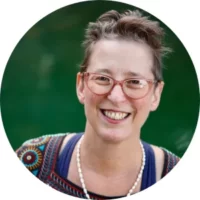 Beth Barany teaches science fiction and fantasy novelists how to write, edit, and publish their books as a coach, teacher, consultant, and developmental editor. She’s an award-winning fantasy and science fiction novelist and runs the podcast, “How To Write The Future.”
Beth Barany teaches science fiction and fantasy novelists how to write, edit, and publish their books as a coach, teacher, consultant, and developmental editor. She’s an award-winning fantasy and science fiction novelist and runs the podcast, “How To Write The Future.”
Learn more about Beth Barany at these sites:
Author site / Coaching site / School of Fiction / Writer’s Fun Zone blog
CONNECT
Contact Beth: https://writersfunzone.com/blog/podcast/#tve-jump-185b4422580
Email: beth@bethbarany.com
LinkedIn: https://www.linkedin.com/in/bethbarany/
IG: https://www.instagram.com/bethbarany/
TT: https://www.tiktok.com/@bethbarany/
FB: https://www.facebook.com/bethbarany
X: https://twitter.com/BethBarany
CREDITS
- EDITED WITH DESCRIPT: https://www.descript.com?lmref=_w1WCA (Refer-a-Friend link)
- MUSIC CREDITS : Music from Uppbeat (free for Creators!): https://uppbeat.io/t/soundroll/fuzz-buzz License code: UMMKDRL02DFGKJ0L. “Fuzz buzz” by Soundroll. Commercial license: https://musicvine.com/track/soundroll/fuzz-buzz.
- DISTRIBUTED BY BUZZSPROUT: https://www.buzzsprout.com/?referrer_id=1994465 (Refer-a-Friend link)
- SHOW PRODUCTION BY Beth Barany
- SHOW CO-PRODUCTION + NOTES by Kerry-Ann McDade
C 2024 BETH BARANY
For more “How To Write the Future” episodes, go here.
If you’d like to invite Beth onto your podcast, drop her a note here.

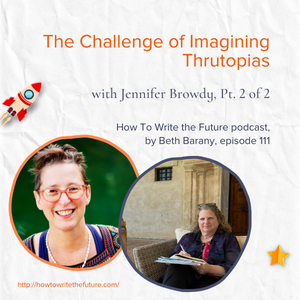

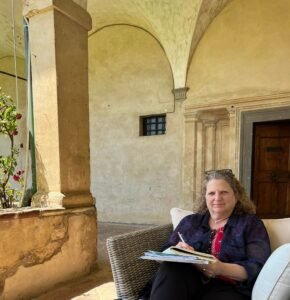
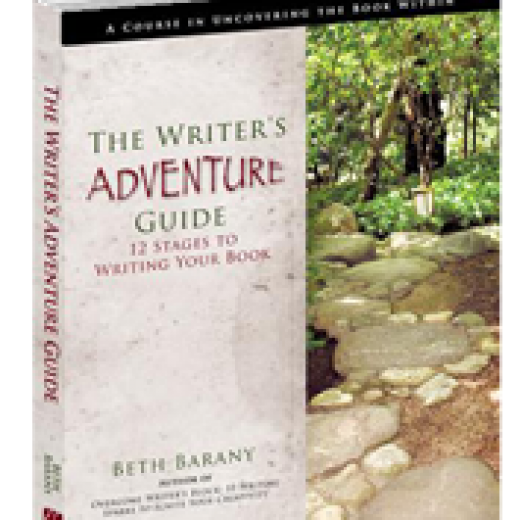
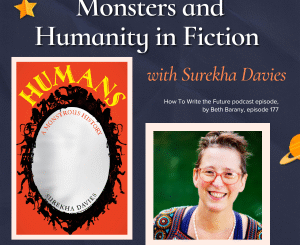
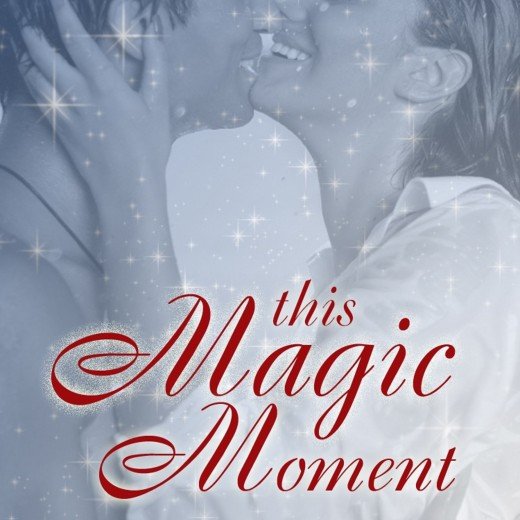
I’m turned off by dystopian stories, and suspicious of utopias–they most always turn dystopian before long. Regarding “positive, optimistic visions for the future,” what would somebody from a hundred years ago think of today? They’d see a lot of wonderful technology and improved health and living standards, but the very same conflicts between nations and groups. So, would they be optimistic? Depends on what they looked at.
Looking into the science fiction future, what can we learn from this past view? What’s the likelihood that everything will be positive and optimistic in a century or two? We’ll still be the same human beings.
I suspect we’ll see many of the same things: Some groups prejudiced against others. People jealous of their neighbors. Some rich, others poor. Things run by stuffy overbearing bureaucrats. Crime and corruption.
But some things ironed out: engineering fixes to climate change, fewer nations run by thugs, a population rebound from the demographic crash we’re now entering, conquest of most diseases.
The wildcard is contact with intelligent alien races that we somehow contact. All of my sci fi novels rely on this occurrence. My stories have neither a positive or negative vision–more a “here’s what happened” vision. I’m not trying to scare or enlighten or goad people to action–just tell a good yarn.
Thanks for the opportunity for me to clarify my own thinking.
You’re so welcome, Mike. It’s great to hear how people think and also what motivates them to write their stories. I love hearing your motivation.